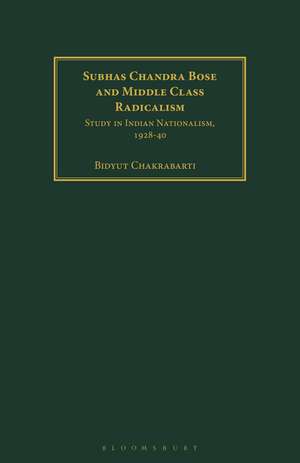Subhas Chandra Bose and Middle Class Radicalism: Study in Indian Nationalism, 1928-40
Autor Bidyut Chakrabartien Limba Engleză Paperback – 22 sep 2021
Preț: 217.91 lei
Preț vechi: 275.01 lei
-21% Nou
Puncte Express: 327
Preț estimativ în valută:
41.70€ • 43.62$ • 34.64£
41.70€ • 43.62$ • 34.64£
Carte tipărită la comandă
Livrare economică 02-16 aprilie
Livrare express 26 februarie-04 martie pentru 80.84 lei
Preluare comenzi: 021 569.72.76
Specificații
ISBN-13: 9781350186576
ISBN-10: 1350186570
Pagini: 256
Dimensiuni: 156 x 234 x 19 mm
Greutate: 0.36 kg
Editura: Bloomsbury Publishing
Colecția Bloomsbury Academic
Locul publicării:London, United Kingdom
ISBN-10: 1350186570
Pagini: 256
Dimensiuni: 156 x 234 x 19 mm
Greutate: 0.36 kg
Editura: Bloomsbury Publishing
Colecția Bloomsbury Academic
Locul publicării:London, United Kingdom
Notă biografică
Bidyut Chakrabarti is a political sociologist. He gained his doctorate at the London School of Economics, UK. He has taught in the United States and India.
Cuprins
List of tablesAcknowledgementsAbbreviationsIntroduction.1. Constraint and Tension in Middle-Class Leadership. 2. The Hindu-Muslim Question. 3. Ambivalence to the Working-Class Struggle4. Bengal Provincial Congress: Operational Dilemma and Organisational ConstraintConclusionAppendix I: Biographical Sketches of Leading Political ActivistsAppendix II: The Composition of the BPCC, 1939179Appendix III-14: Point Election Manifesto of the KPP, Declared in the 1936 Dacca SessionNotesGlossarySelected BibliographyIndex
